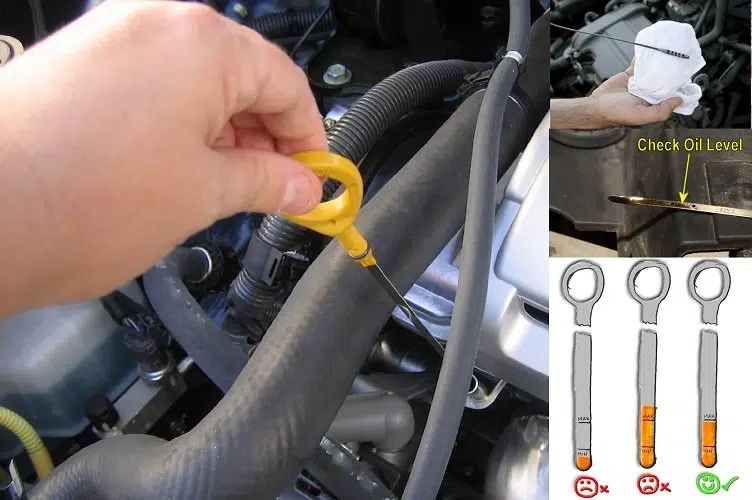When Is The Best Time To Check Car Oil – is the article you’re searching for. Hopefully, you can find information related to When Is The Best Time To Check Car Oil here, all of which we’ve summarized from various reliable sources.

When is the Best Time to Check Your Car Oil?
Regularly checking your car’s oil is crucial for maintaining its health and ensuring optimal performance. Neglecting oil changes or failing to monitor oil levels can lead to costly engine repairs or even complete engine failure.
In this comprehensive guide, we will explore the optimal timing for checking your car’s oil, discuss the latest trends in oil maintenance, and provide practical tips and expert advice to keep your vehicle running smoothly. Whether you’re a seasoned motorist or a novice behind the wheel, this article will equip you with valuable knowledge to safeguard your car’s engine.
Timing Your Oil Checks
The ideal time to check your car’s oil is:
- Before starting the engine. Checking the oil when the engine is cold ensures that all the oil has settled into the oil pan, providing an accurate reading.
- After the car has been parked for several hours. This allows the oil to drain back into the oil pan.
Frequency of oil checks may vary depending on your driving habits and the type of oil used. However, it’s generally recommended to check your oil at least once a month or before embarking on long trips.
Understanding Oil Levels and Dipsticks
Most vehicles have a dipstick located near the front of the engine. The dipstick is used to measure the oil level. To check the oil level, follow these steps:
- Pull out the dipstick and wipe it clean with a paper towel or rag.
- Reinsert the dipstick fully into the tube.
- Pull out the dipstick again and check the oil level. The oil should be between the “min” and “max” marks on the dipstick.
If the oil level is low, you will need to add oil to the engine. Consult your vehicle’s owner’s manual for the recommended type and amount of oil.
The Importance of Using the Correct Oil
Using the correct type of oil specified in your vehicle’s owner’s manual is crucial. Different types of oil have different viscosities, which affect their ability to lubricate and protect the engine. Using the wrong oil can damage your engine and void your warranty.
There are three main types of oil:
- Conventional oil is the most basic type of oil and is suitable for older vehicles with fewer than 75,000 miles.
- Synthetic oil is a high-quality oil that provides better protection and performance than conventional oil. It is recommended for newer vehicles and for vehicles that operate in extreme conditions.
- Semi-synthetic oil is a blend of conventional and synthetic oil, offering a balance of cost and performance.
Expert Tips for Effective Oil Management
Here are some tips from automotive experts for effective oil management:
- Change your oil regularly. Follow the manufacturer’s recommended oil change intervals. For most vehicles, this is every 5,000 to 7,500 miles.
- Check your oil level frequently. Check your oil at least monthly or before long trips.
- Use the correct type of oil. Consult your vehicle’s owner’s manual for the recommended type and weight of oil.
- Monitor oil consumption. If you notice that your car is consuming oil excessively, it may be a sign of a leak or other engine problems.
- Keep a record of oil changes. Keep track of when you changed your oil and the type of oil you used. This information will be helpful if you need to troubleshoot engine problems or make a warranty claim.
By following these tips, you can ensure that your car’s engine is properly lubricated and protected, extending its life and improving its performance.
Frequently Asked Questions
Q: What happens if I don’t check my oil regularly?
A: Failing to check your oil regularly can lead to low oil levels, which can cause engine damage. Low oil levels can also lead to overheating and premature engine wear.
Q: Can I use any type of oil in my car?
A: No, it is important to use the type of oil recommended in your vehicle’s owner’s manual. Using the wrong type of oil can damage your engine.
Q: How often should I change my oil?
A: Most vehicles require an oil change every 5,000 to 7,500 miles. Consult your vehicle’s owner’s manual for the specific recommended interval.
Conclusion
Regularly checking your car’s oil is a simple but crucial task that can help you avoid costly engine repairs and extend the life of your vehicle. By following the tips and advice outlined in this guide, you can ensure that your car’s engine is properly lubricated, protected, and performing at its best. Remember, taking care of your oil is taking care of your car.
If you found this article informative, please share it with your friends and family. Let’s spread the knowledge and empower car owners with the tools they need to keep their vehicles running smoothly for years to come. Are there any other topics related to car maintenance that you would like to know more about?

Image: www.goodyeartillymill.com
We express our gratitude for your visit to our site and for reading When Is The Best Time To Check Car Oil. We hope this article is beneficial for you.